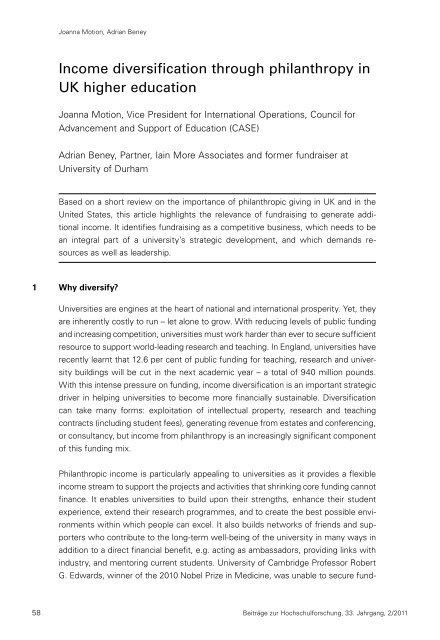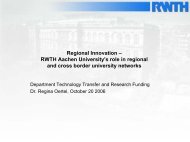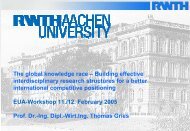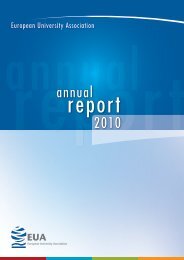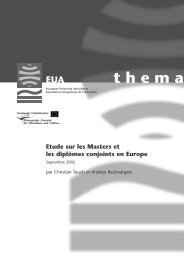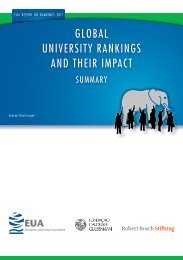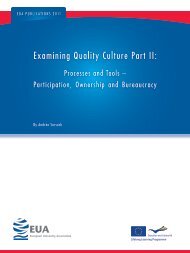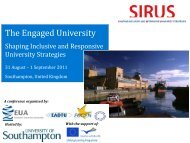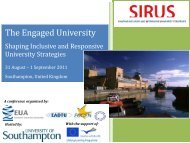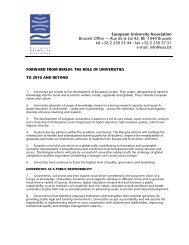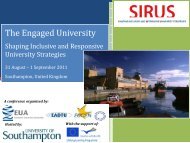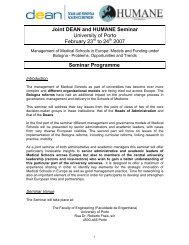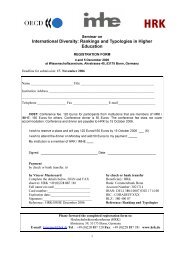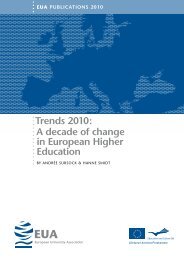Beiträge zur Hochschulforschung - European University Association
Beiträge zur Hochschulforschung - European University Association
Beiträge zur Hochschulforschung - European University Association
You also want an ePaper? Increase the reach of your titles
YUMPU automatically turns print PDFs into web optimized ePapers that Google loves.
58<br />
Joanna Motion, Adrian Beney<br />
Income diversification through philanthropy in<br />
UK higher education<br />
Joanna Motion, Vice President for International Operations, Council for<br />
Advancement and Support of Education (CASE)<br />
Adrian Beney, Partner, Iain More Associates and former fundraiser at<br />
<strong>University</strong> of Durham<br />
Based on a short review on the importance of philanthropic giving in UK and in the<br />
United States, this article highlights the relevance of fundraising to generate addi-<br />
tional income. It identifies fundraising as a competitive business, which needs to be<br />
an integral part of a university’s strategic development, and which demands re-<br />
sources as well as leadership.<br />
1 Why diversify?<br />
Universities are engines at the heart of national and international prosperity. Yet, they<br />
are inherently costly to run – let alone to grow. With reducing levels of public funding<br />
and increasing competition, universities must work harder than ever to secure sufficient<br />
resource to support world-leading research and teaching. In England, universities have<br />
recently learnt that 12.6 per cent of public funding for teaching, research and univer-<br />
sity buildings will be cut in the next academic year – a total of 940 million pounds.<br />
With this intense pressure on funding, income diversification is an important strategic<br />
driver in helping universities to become more financially sustainable. Diversification<br />
can take many forms: exploitation of intellectual property, research and teaching<br />
contracts (including student fees), generating revenue from estates and conferencing,<br />
or consultancy, but income from philanthropy is an increasingly significant component<br />
of this funding mix.<br />
Philanthropic income is particularly appealing to universities as it provides a flexible<br />
income stream to support the projects and activities that shrinking core funding cannot<br />
finance. It enables universities to build upon their strengths, enhance their student<br />
experience, extend their research programmes, and to create the best possible envi-<br />
ronments within which people can excel. It also builds networks of friends and sup-<br />
porters who contribute to the long-term well-being of the university in many ways in<br />
addition to a direct financial benefit, e.g. acting as ambassadors, providing links with<br />
industry, and mentoring current students. <strong>University</strong> of Cambridge Professor Robert<br />
G. Edwards, winner of the 2010 Nobel Prize in Medicine, was unable to secure fund-<br />
<strong>Beiträge</strong> <strong>zur</strong> <strong>Hochschulforschung</strong>, 33. Jahrgang, 2/2011


